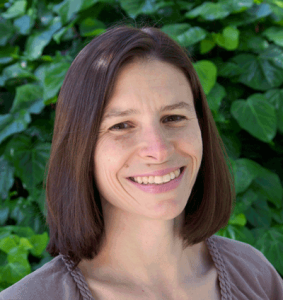WALNUT CREEK, Calif.—The U.S. Department of Energy (DOE) Office of Science Early Career Research Program has awarded a grant to DOE Joint Genome Institute scientist Susannah Green Tringe to conduct genomic studies of microbial communities (metagenomes) in restored wetlands around the San Francisco Bay-Delta region of California.
Tringe, who heads the DOE JGI Metagenome Program, and 64 other applicants had been awarded funding for their projects from more than 1,100 proposals received.
Tringe plans to use the five-year grant to study the roles microbial communities play in restored wetlands, and their impact on long-term carbon sequestration, from a genomic perspective. “Restoration of wetlands has the potential to remove significant amounts of carbon dioxide from the atmosphere, due to rapid accumulation of emergent vegetation and low rates of biomass decomposition in the anoxic soil,” she wrote in her proposal. “Most of the long-term carbon storage takes place in the soil or sediment, yet little is known about the belowground microbial communities that are likely key determinants of the relative balance between carbon storage and atmospheric recycling.”
“This is a very well-deserved honor for Susannah,” said Eddy Rubin, DOE JGI Director, who mentored Tringe over the last eight years along her upward career trajectory at the Institute. “She has been a major contributor to ground-breaking comparative analyses of environmental microbial communities that have been published in some of the highest impact journals—Science and Nature.”
The first year of Tringe’s awarded study will focus on the restored wetlands of Twitchell Island in the Sacramento/San Joaquin Delta. Studies conducted by the U.S. Geological Survey indicate that the area has a carbon sequestration rate of 1 kilogram per square meter per year, which, Tringe said, “is comparable to, if not greater than” the carbon sequestration rates achieved from tropical reforestation.
“In subsequent years I plan to sample and study additional wetlands, particularly brackish and saline in addition to the freshwater wetlands in the Delta,” she said. “Specific sites for those aren’t yet determined, but there are a lot of wetlands restoration projects all around the Bay.”
Tringe joined the DOE JGI in 2003 as a postdoctoral fellow after completing her doctoral studies at Stanford University and completing a postdoctoral fellowship at the University of New Mexico. She has served as DOE JGI Microbial Systems Group Lead and then Deputy Metagenome Program Head. She has been involved in several metagenomic studies, including the study of microbial communities in the termite hindgut, the leaf cutter ant and the cow rumen, as well as the microbial communities in ocean dead zones.
The DOE Early Career Research Program funds principal investigators who have received their Ph.Ds within the last 10 years and are either untenured assistant professors on the tenure track, untenured associate professors on the tenure track, or full-time, nonpostdoctoral, permanent DOE national laboratory employees. The minimum award size is $150,000 per year for five years for universities and $500,000 per year for five years for DOE national laboratories.
To see the full list of Program awardees and their proposal abstracts, go to http://science.energy.gov/early-career/
The U.S. Department of Energy Joint Genome Institute, supported by the DOE Office of Science, is committed to advancing genomics in support of DOE missions related to clean energy generation and environmental characterization and cleanup. DOE JGI, headquartered in Walnut Creek, Calif., provides integrated high-throughput sequencing and computational analysis that enable systems-based scientific approaches to these challenges. Follow DOE JGI on Twitter.
